
Fredric Joseph Kroll (born February 7, 1945, in Brooklyn, New York) is an American-German composer and writer.

Fredric Joseph Kroll (born February 7, 1945, in Brooklyn, New York) is an American-German composer and writer.
Kroll was born in 1945 as the only child of the piano teacher and schoolteacher Alexander Kroll, born in New York City as the fourth child of White Russian Jewish immigrants, and the elementary school teacher Sarah Kroll, née Mahler, born in Warsaw. At the age of eleven, he began to compose a cycle of 30 piano pieces in all tonalities, including the enharmonic relationships, to explore the potentials of each tonality to express different emotions. He called them “Episodes,” in order to distinguish them from Chopin's “Préludes.” Although of uneven quality, they represent a quarry of thematic material (partially with Russian Jewish flavor) from which Kroll was later to draw in his magnum opus, his four-act opera “The Scarlet Letter.” He had written but five of the “Episodes” when, shortly after his twelfth birthday, he composed his Piano Sonata in B Minor which, albeit still brief, is a harbinger of his later ability to create in large forms. His Symphony in G Minor, written from 1957 to 1959, has a performance duration of about half an hour.
Kroll's further juvenilia include numerous piano pieces and a Sonata for Violin and Piano in G Minor (1958). A movement away from mere juvenilia makes itself noticeable in the ballad “Ulalume” after Edgar Allan Poe (autumn 1959), with which Kroll began, in effect, to discover his talent for vocal music.
1960 was a pivotal year for Fredric Kroll. In February, he read Nathaniel Hawthorne's novel “The Scarlet Letter” as required reading at James Madison High School in Brooklyn, and immediately set about composing the original version of the Prelude (radically rewritten in 1962, except for the beginning and the conclusion). On August 9, he discovered Klaus Mann's novel “Pathetic Symphony” about Tchaikovsky, and bought, on the same day, his first recordings of works by Gustav Mahler. Having already studied orchestral scores by Tchaikovsky, Beethoven, and Brahms, he began, in 1960, to learn the actual technique of composition by playing through the piano-vocal scores of Puccini, Verdi, Alfredo Catalani, Tchaikovsky, and Vittorio Giannini's operatic setting of “The Scarlet Letter” from 1938.
Kroll was rejected by the Eastman School of Music at the beginning of 1961 because he played neither oboe nor piano sufficiently well to meet the requirements for admission. The University of Rochester urged him to choose another major, and he opted for German Literature – with the intention of teaching German to voice students later on and thus entering the world of music through the back door, so to speak. During whatever spare time his studies afforded, Kroll continued to work on his own operatic version of “The Scarlet Letter,” completing the piano-vocal score on January 10, 1965, and devoting the subsequent months to writing his Senior Essay on the influence of Schopenhauer's philosophy on Richard Wagner's “Tristan und Isolde.” He received his A.B. In German Literature from the University of Rochester in 1965.
Partly as a result of the Metropolitan Opera's rejection of “The Scarlet Letter,” Kroll switched from composing operas to composing lieder, for the time being. His first collection, “Lieder aus der Einsamkeit” (1965–66), is a kind of by-product of “The Scarlet Letter” and attempts to fuse the genre of the lied with operatic elements. His following cycle to Italian texts by Henry Fregosi Loyzelle, “Frantumi” (“Shards of Glass,” 1967–69), is an antithetical experiment employing relatively sparse piano accompaniment.
Kroll earned his Artium Magister (Master of Arts degree) at Yale University in 1967. Having originally intended to cease graduate school at this point and start teaching, the outbreak of the Vietnam War necessitated his studying for a Ph.D. to avoid being drafted, and he returned to Rochester, where he prepared his doctoral thesis on Klaus Mann. In the summer of 1969 he received a Fellowship from the University of Würzburg and welcomed the opportunity to return to Germany – where he had already spent his Junior Year Abroad in 1963–64, while still composing “The Scarlet Letter” - to be the first person from outside the intimate circle of the Mann family to study Klaus Mann's unpublished manuscripts - about half of which are in English - near Zurich in April, 1970. He started writing his dissertation in the fall of that year and was awarded his Ph.D. by the University of Rochester in 1973. During this time, he still struggled to compose lieder whenever possible.
From 1973 to 1974, in Berlin, Kroll completed his investigations into those of Klaus Mann's major works which his dissertation had not yet covered, and then received a part-time engagement as a teacher, more of German than of English, at Carl von Ossietzky High School in Hamburg-Poppenbüttel. A stint as a commercial translator in Kirchzarten near Freiburg followed in 1975 until the beginning of 1977, when he was commissioned by the Edition Klaus Blahak in Espelkamp to write the most comprehensive biography possible on Klaus Mann. During a hiatus in this task, from 1979 to 1980, he composed Act 1 of his second opera, “Eine Nacht an der Newa” (“A Night on the Neva”), on Dostoevsky's novella “White Nights” - the subject of which he had first encountered as a TV dramatization in Freiburg in 1964.
1980 brought with it the rediscovery in Germany of German Literature in exile from Nazi Germany, and with it the rediscovery of Klaus Mann – especially of his novel “Mephisto,” which was still banned in Germany. Suddenly, Kroll's work on Klaus Mann was in something akin to popular demand. After the triumphant staged world premiere of his “Scarlet Letter” with piano accompaniment under Kroll's own direction at Cape Coral High School in Florida on January 10, 1981 (on the selfsame evening, the first Klaus Mann exposition of all time opened in Ahlen in Westphalia, West Germany), Kroll composed up to and including 2003 only two songs, “Den ungeborenen Enkeln” (“To the Unborn Grandchildren,” 1986, after Clemens Brentano) and “Der Steppenwolf” after Hermann Hesse (2000) – in his own estimation, two of his best works. During this period, in the summer semesters of 1988 and 1989, Kroll led two undergraduate seminars at the University of Freiburg.
The entirety of Kroll's 3,000-page biography of Klaus Mann was published by the Männerschwarm Verlag in Hamburg on the occasion of the centennial of Klaus Mann's birth in 2006. For this occasion, and during a kind of working holiday in Fortaleza, Brazil, Kroll also edited and translated into German for the Rowohlt Verlag, Hamburg, fragments belonging to the sphere of Klaus Mann's autobiography “Der Wendepunkt” which had hitherto been published only in English (under the title “The Turning Point,” 1942), in Swedish – or not at all. After the centennial celebrations were over, Kroll began – again in Fortaleza – to carry out his intention, of which he had never lost sight, of orchestrating “The Scarlet Letter,” adding a considerable amount of counterpoint as he went along. This task was completed in February, 2010. Kroll then set nearly half of his 41 lieder for printing at the computer, orchestrated Act 1 of “Eine Nacht an der Newa,” and composed and orchestrated Act 3. Act 2 is currently being composed as of December 2016.
In his own words, Fredric Kroll construes himself as a practitioner, not as a theoretician. When he started composing “The Scarlet Letter” in earnest in 1961, Robert Ward's neither musically or nor dramatically dissimilar opera “The Crucible” was premiered with success. It was not until 1964 in Freiburg that Kroll realized that the tonal and melodic Late Romantic music still today dear to his heart was considered to be obsolete and anachronistic. Kroll feels that writing only dissonances that never resolve is tantamount to an attempt to inhale without ever exhaling, to eat hot spices without meat or vegetables. To those who might reproach Kroll's music with “ escapism,” he replies that his compositions are not escapist at all, but replete with deep despair over the human condition, and that he feels it to be his mission to communicate to people imbued with compassion, to people to whom “just wanting to have fun” is alien in a world full of suffering, that they are not alone with their sorrows and their burdens.

Kurt Julian Weill was a German-born American composer active from the 1920s in his native country, and in his later years in the United States. He was a leading composer for the stage who was best known for his fruitful collaborations with Bertolt Brecht. With Brecht, he developed productions such as his best-known work, The Threepenny Opera, which included the ballad "Mack the Knife". Weill held the ideal of writing music that served a socially useful purpose, Gebrauchsmusik. He also wrote several works for the concert hall and a number of works on Jewish themes. He became a United States citizen on August 27, 1943.

Dietrich Fischer-Dieskau was a German lyric baritone and conductor of classical music. One of the most famous Lieder performers of the post-war period, he is best known as a singer of Franz Schubert's Lieder, particularly "Winterreise" of which his recordings with accompanists Gerald Moore and Jörg Demus are still critically acclaimed half a century after their release.

Winterreise is a song cycle for voice and piano by Franz Schubert, a setting of 24 poems by German poet Wilhelm Müller. It is the second of Schubert's two song cycles on Müller's poems, the earlier being Die schöne Müllerin.

Gustaf Gründgens, born Gustav Heinrich Arnold Gründgens, was one of Germany's most famous and influential actors of the 20th century, and artistic director of theatres in Berlin, Düsseldorf, and Hamburg. His career continued unimpeded through the years of the Nazi regime; the extent to which this can be considered as deliberate collaboration with the Nazis is hotly disputed.
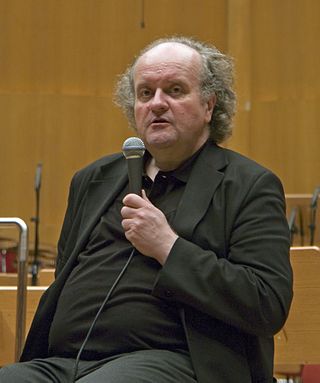
Wolfgang Rihm is a German composer and academic teacher. He is musical director of the Institute of New Music and Media at the University of Music Karlsruhe and has been composer in residence at the Lucerne Festival and the Salzburg Festival. He was honoured as Officier of the Ordre des Arts et des Lettres in 2001. His musical work includes more than 500 works. In 2012, The Guardian wrote: "enormous output and bewildering variety of styles and sounds".
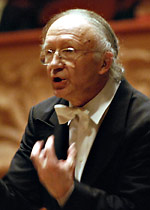
Heinz Robert Holliger is a Swiss virtuoso oboist, composer and conductor. Celebrated for his versatility and technique, Holliger is among the most prominent oboists of his generation. His repertoire includes Baroque and Classical pieces, but he has regularly engaged in lesser known pieces of Romantic music, as well as his own compositions. He often performed contemporary works with his wife, the harpist Ursula Holliger; composers such as Berio, Carter, Henze, Krenek, Lutosławski, Martin, Penderecki, Stockhausen and Yun have written works for him. Holliger is a noted composer himself, writing works such as the opera Schneewittchen (1998).

Conradin Kreutzer or Kreuzer was a German composer and conductor. His works include the operas Das Nachtlager in Granada and incidental music to Der Verschwender, both produced in 1834 in Vienna.
The Scarlet Letter is an 1850 novel by Nathaniel Hawthorne.
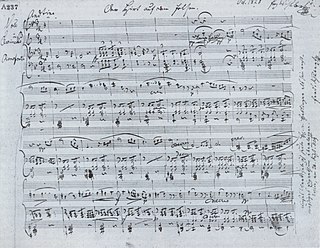
"The Shepherd on the Rock", D. 965, is a Lied for soprano, clarinet, and piano by Franz Schubert. It was composed in 1828 during the final months of his life.
Johannes Wolfgang Zender was a German conductor and composer. He was the chief conductor of several opera houses, and his compositions, many of them vocal music, have been performed at international festivals.

Toshio Hosokawa is a Japanese composer of contemporary classical music. He studied in Germany but returned to Japan, finding a personal style inspired by classical Japanese music and culture. He has composed operas, the oratorio Voiceless Voice in Hiroshima, and instrumental music.

Marlis Petersen is a German operatic coloratura soprano.
Friedrich Wilhelm Grund was a German composer, conductor and teacher.

Ingeborg Bronsart von Schellendorf was a Finnish-German composer.
Drei Lieder, for alto voice and chamber orchestra, is a song cycle by Karlheinz Stockhausen, written while he was still a conservatory student in 1950. In the composer's catalogue of works, it bears the number 1/10.

Andrej Ivanovich Hoteev was a Russian classical pianist.
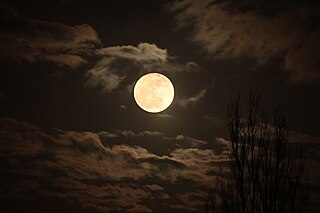
"Der Mondabend", WAB 200, is a lied composed by Anton Bruckner in c. 1850 for Aloisia Bogner.
Hans Peter Blochwitz is a German lyric tenor, who is known internationally in opera and concert, especially for singing parts in Mozart operas.
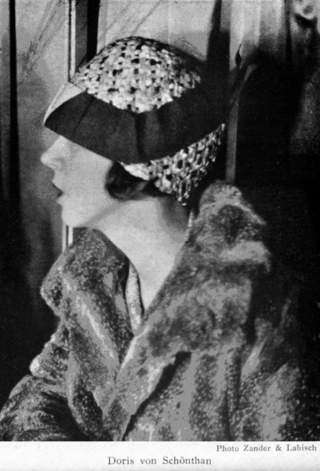
Doris von Schönthan (1905–1961), born Maria-Dorothea Ehemann, called 'Dorinde', was a German model, a copywriter, journalist and photographer. She is characterised as a dazzling figure of the Weimar Republic or bohemian of the Roaring Twenties.